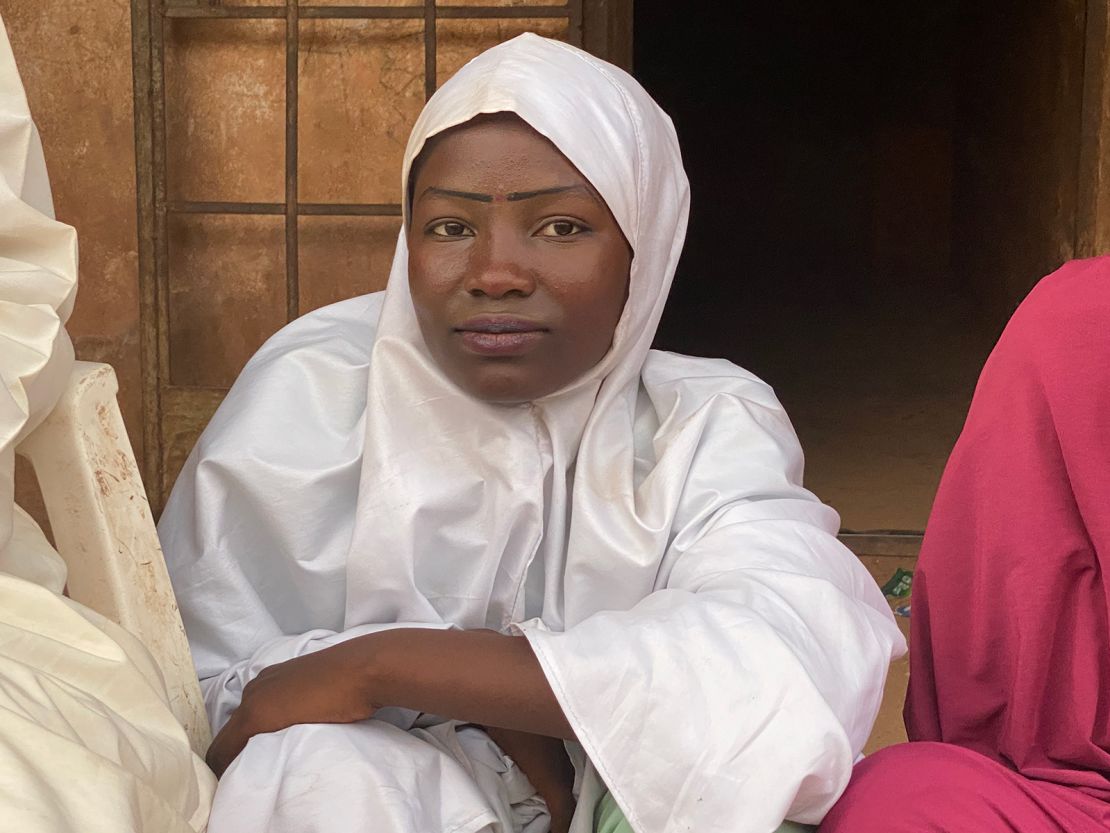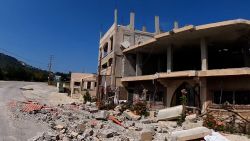Habiba Iliyasu, 15, was asleep in her school dormitory in northwestern Nigeria when a group of armed men burst in and ordered her and her schoolmates out of bed.
The schoolgirls – 279 in total – were rounded up by the men, who arrived at the school on motorbikes.
“They fired guns. Some of them came into the school while others stayed at the gate,” Habiba recalls of the ordeal on February 26, which prompted global outrage and prayers from Pope Francis for the release of the captives.
Taken from her dormitory at the Government Girls’ Secondary School in the town of Jangebe, Zamfara state, they were forced to walk through the night into the forest where the kidnappers camped out, she tells CNN.
Some of the girls did not have time to put on shoes and were forced to walk barefoot, sustaining cuts and injuries, Habiba says.
Inside the kidnappers’ den
When they got to the kidnapper’s hideout, Habiba saw two people she recognized instantly – her father Iliyasu Magaji, 65, and her sister, Raliya Gusaram, 33.
Her elder sister was in the forest with her two children Isah, 4, and Rabiatu, 2, Habiba says.
“I first saw my older sister, it was after seeing her that I saw my dad, he was seated. One of them (the kidnappers) hit him and asked him to come forward and sit at a particular spot,” she says.
Habiba was forced to pretend she didn’t recognize her family members.
“I pretended not to know them because if I showed I know them I would be held back with them. I was really hurt, all I kept uttering (was) the prayer ‘Allah is enough, a helper and a guardian,’ I prayed that may we be released together.”
Later, she says she started to cry as she became overwhelmed by the situation.
“My sister told me not to cry, that you get beaten if you cry.”
For Magaji, seeing his youngest daughter, Habiba, in the clutches of the kidnappers was heartbreaking.
He recalls weeping when he saw her.
“I was extremely sad, I started crying. Later I remembered Allah is in control of everything and I stopped crying,” he tells CNN.
Magaji says he despaired what might happen to Habiba if he acknowledged her.
“I pretended I didn’t know her, I didn’t talk to her and I wouldn’t look at her because I was afraid they would know she is my daughter and as a result harm her or harm me.”

His time in the forest was marked by near-daily beatings and at one point, he was attacked with a machete, he says, showing CNN the scar on his right shoulder where he was struck.
“He wanted to cut off the hand,” Magaji says, gesturing. “You can see, the spot still hurts. I can’t lift this hand high up.”
Magaji says he was abducted in the middle of the night by armed men outside his house in the village of Gwaram, Zamfara state, one of the worst-affected parts of the country.
“I rose to urinate and when I approached the spot I came across some people,” he says. “When I got closer to see who they were, they accosted me with guns … and threatened to shoot me.”
Magaji says he was taken to the forest with a group of others and the kidnappers demanded a ransom of 10 million naira (about $26,000).
It was an impossible sum for Magaji – a farmer – to raise.

He says the bandits would put pressure on loved ones to raise money by making him stand on burning coal when he called his family so they could hear his screams of agony.
His wife Rukkaya Iliyasu, 58, was left alone, and distraught at home, frantically trying to raise the money from her meager earnings selling groundnuts and bean cakes.
“My tears dried up,” she told CNN. “I couldn’t cry anymore. We sold our land, camels, maize, crops. Everything,” she says with a deep sigh.
In the end, they say they managed to raise just over two million naira ($5,000) after selling virtually all their belongings and crowdfunding for contributions.
It was only after Habiba was freed and told the state governor about his plight that he and others were eventually released, Magaji says.
In all, Magaji would spend three months and two weeks in the forest with his eldest daughter and two grandchildren.
No longer ideological
Kidnapping has become one of the major security challenges in Nigeria.
Figures are hard to come by due to under-reporting, but a study by the Nigeria Security Tracker (NST), which maps political violence in the country, states that there have been more than 200 kidnapping incidents so far this year with at least 2,043 victims. There were an estimated 437 kidnapping incidents with 2,879 victims for the whole of 2020, NST figures show.
Although Asch Harwood, who oversees the tracker, told CNN these figures are likely underestimated due to under-reporting of kidnapping cases.
Kidnapping has been prevalent in the oil-rich south of Nigeria for decades as militants fight for control over resources. They kidnapped foreign oil workers and expatriates to attract international attention to their cause. Similarly, the Islamist militant group Boko Haram has carried out thousands of kidnappings in the 12-year insurgency waged in the country’s northeast.
However, the landscape has now changed and the new wave of kidnappers are not agitating for political or religious ideology, their motive is simply to make money, analysts say.
“Kidnapping has morphed from being ideological, like in the Delta region, where they pressed for demands and control for resources. What we have now is purely criminal and that is what is driving the trend now,” says Don Okereke, a Nigerian security analyst.
It is a phenomenon described by Matthew Page, an associate fellow on the Africa program at Chatham House think tank, as “violence entrepreneurship.”
Marauding groups, known locally as bandits, operate from forest enclaves in northwestern Nigeria, where they organize attacks and kidnappings on rural areas and Nigeria’s major road networks.
Between June 2011 and the end of March 2020, an estimated $18.34 million was paid in ransoms, according to Lagos-based SBM Intelligence in a report last year titled “The economics of the kidnap industry in Nigeria.”
Former Nigerian senator, Shehu Sani, who helped in negotiations to free some of the kidnapped Chibok schoolgirls, estimates that the true figure is far higher.
“Just in the last five years, even at a rough estimate, over $100 million has been paid by either individuals or organizations to terror groups, or to bandits for ransom … thousands of people have also been killed, and millions of people have been displaced,” he tells CNN.
Sani says the bandits are often ruthless and execute people who fail to meet their ransom demands – and make the families pay to pick up their bodies.
“I know family members who went to pay ransoms after the deadline but had to pay to pick up the corpse. Ransom encourages kidnapping, but refusal to pay a ransom will lead to the slaughter of innocent persons,” he says.
In 2017, Nigeria’s senate approved the death sentence for kidnappings in instances where they lead to deaths but many Nigerians don’t risk reporting to security agencies for fear their family members will be harmed. Most find ways to raise the money, usually by selling belongings and quietly pay ransoms to free their loved ones.
‘The Chibok effect’
As well as raiding villages, there has been a recent surge in kidnappers targeting schools – nearly 800 children have been taken in the past four months alone. There have been four kidnappings from academic institutions in northern Nigeria since the start of the year. In the latest incident, three of the 20 students kidnapped from Greenfield University in Kaduna were killed last week.
In contrast to her family, Habiba was freed along with her schoolmates after just three days. Zamfara’s state governor Bello Matawalle denied paying a ransom but said “repentant bandits” negotiated their release.
Many believe that the infamous 2014 Chibok abductions by Boko Haram helped make schools a lucrative target.
“They saw what happened with Boko Haram and the Chibok girls and bandits have adopted the same strategy,” Sani says, explaining that authorities paid more attention to abductions of students than of any other sectors of society. “It is difficult for them to stop kidnapping … they have discovered that it is a gold mine.”
As for the Iliyasu family, their experience has left them near destitute, but Habiba is back in school and determined to continue with her education.
“I am not scared of anything,” she says.
Isaac Abrak, CNN’s Florence Davey-Attlee and Fridah Okutoyi contributed to this report

















